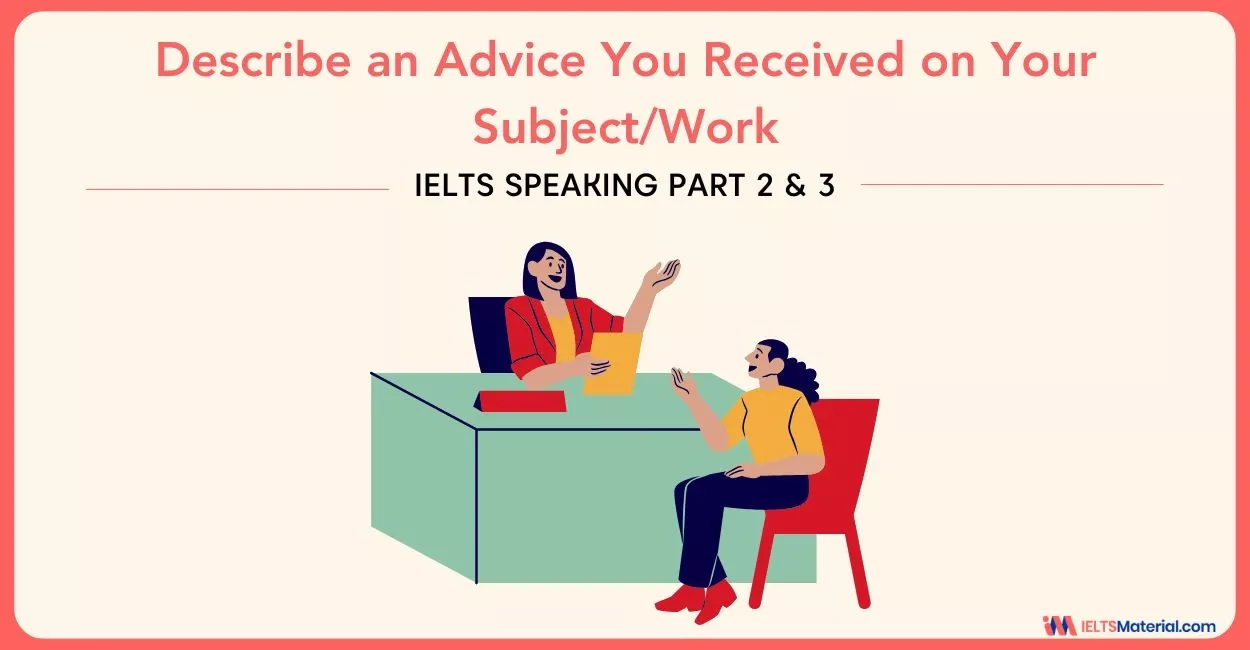Describe an Advice You Received on Your Subject or Work - IELTS Speaking Part 2 & 3
8 min read
Updated On
-
Copy link
Go through the sample answers for the IELTS cue card, ‘Describe an Advice You Received on Your Subject or Work’ here. You can also explore Part 3 questions & sample answers, IELTS speaking vocabulary, and learn how to achieve a speaking band score of 9.
Table of Contents

Limited-Time Offer : Access a FREE 10-Day IELTS Study Plan!
Advice plays an important role in both our personal and professional development. In the context of academics or work, a single piece of guidance can change the way we approach challenges, manage responsibilities, or even choose our career path. The IELTS Speaking test often includes cue cards that ask candidates to recall meaningful experiences, and one popular topic is ‘Describe an advice you received on your subject or work’.
In this blog, we will have a look at the sample answers on the IELTS cue card topic, ‘Describe an advice you received on your subject or work’, to help you know how to prepare a cue card for IELTS Speaking, along with Part 3 questions and relevant vocabulary to brush up on your speaking skills.
Describe an Advice You Received on Your Subject or Work IELTS Speaking Part 2 Question & Sample Answers
In IELTS Speaking Part 2, cue card topics like ‘Describe an Advice You Received on Your Subject or Work’ usually test your ability to expand on a personal experience in a structured and fluent manner. A strong answer should be detailed, personal, and reflective. It should show how the advice influenced your life beyond just academics or work.
Describe an advice you receive on your subject or work.
You should say:
- What it was and who you received it from
- What you did after receiving it
- And how you felt about it
Now, let us explore the sample answers to this cue card, which will help you structure your response effectively.
Describe an Advice You Received on Your Subject or Work - Sample Answer 1
- What it was and who you received it from?
Today, I would like to talk about some advice my sister gave me regarding my studies. It was when I completed my university graduation, and I had to decide what I wanted to do in my life. Back then, I was at a crossroads, where I had to choose between embarking on further studies abroad or working full-time with my bachelor’s degree. I wanted an option that would provide me a promising future and at the same time should be interesting as well. Understandably, higher academic qualifications nowadays are virtually a prerequisite for employment, especially in grey-matter fields where rivalry is cutthroat for graduates. I searched a lot on the internet about courses and sought advice from friends and relatives, yet still felt unassured. So, I decided to consult my elder sister, who was living in America and working at an advertising company.
- What you did after receiving it?
On receiving my question, she talked to me a lot and also pondered on it. Having weighed up the pros and cons of each scenario, she advised me to continue to study for a Master’s degree instead of working early. She believed that a master’s degree could open many career doors for young people, including specific career fields, advancement opportunities, and higher salaries. As the workforce evolves, a graduate degree shows a person is dedicated to enhancing his industry expertise and credibility. I trusted her and followed her advice. Without her, I could not have made the most crucial decision of my life.
- And how you felt about it?
I felt incredibly grateful for my sister’s advice and emotional support. She told me that no matter what road I choose, I need to stick to it until the end and make it the most meaningful one. It is one of the reasons I always want to see her perspective before making any vital moves, as she is so experienced and insightful.
Feeling unsure while practicing IELTS Speaking Part 2 cue cards?
Book a FREE Demo to learn from experts!
Describe an Advice You Received on Your Subject or Work - Sample Answer 2
- What it was and who you received it from?
One of the most valuable pieces of advice I ever received came from my academic mentor during my final year of university. I was preparing for a series of crucial exams while also working on my thesis, and I often felt overwhelmed. My mentor advised me to stop trying to multitask constantly and instead to prioritise my tasks by urgency and importance.
- What you did after receiving it?
After receiving this advice, I started using a simple system of making daily to-do lists. I divided my tasks into smaller, manageable sections and allocated specific time slots to each. Instead of switching between assignments randomly, I focused on completing one task at a time. This approach allowed me to study more efficiently and complete my thesis well before the deadline.
- And how you felt about it?
I felt extremely relieved and grateful. Not only did this advice reduce my stress levels, but it also improved my confidence because I could clearly see my progress every day. Even now, in my professional life, I use the same method of prioritisation, and I consider it a transformative lesson that continues to benefit me.
Boost your IELTS Speaking score with expert guidance—join our online webinar now!
Vocabulary for Describe an Advice You Received on Your Subject or Work IELTS Cue Card
We have listed some of the latest IELTS speaking vocabulary to boost your score that we have used in the above sample answers for ‘Describe an Advice You Received on Your Subject or Work’, and you can boost your score.
|
Word/Expression |
Meaning |
Example Sentence |
|---|---|---|
|
At a crossroads |
to be at a stage in life when you have to make a very important decision |
After completing my undergraduate studies, I felt I was at a crossroads between pursuing higher education and starting a job. |
|
Prerequisite |
something that must exist or happen before something else can occur |
Strong communication skills are a prerequisite for success in management roles. |
|
Rivalry |
a situation in which people, businesses, or groups compete for the same goal |
The long-standing rivalry between the two football clubs makes every match intense. |
|
Cut-throat |
extremely competitive in a way that is unfair or harmful |
The fashion industry is known for its cut-throat competition, where only the most innovative brands survive. |
|
Consult |
to discuss something with someone before making a decision |
I always consult my mentor before making important academic choices. |
|
Advancement |
the development, progress, or improvement of something |
Technological advancement has revolutionised how we communicate globally. |
|
Evolve |
to develop gradually, or to cause something to develop gradually |
Over time, my study habits evolved into a more organised and efficient routine. |
|
Credibility |
the quality of being trusted or believed |
The politician lost credibility after failing to deliver on his promises. |
|
Grateful |
feeling or showing appreciation; thankful |
I am truly grateful for the guidance I received from my teacher during exam preparation. |
|
Mentor |
an experienced and trusted adviser who guides someone less experienced |
Having a mentor helped me navigate the challenges of my first job. |
|
Overwhelmed |
feeling stressed or unable to cope due to having too much to handle |
I felt overwhelmed by the number of assignments I had to complete in one week. |
|
Prioritisation |
the action or process of deciding the importance order of tasks |
Effective prioritisation is key to managing both academic and personal responsibilities. |
Describe an Advice You Received on Your Subject or Work – IELTS Cue Card Part 3 Follow-Up Questions
To be better prepared, review the IELTS Speaking Part 3 questions related to the Describe an Advice You Received on Your Subject or Work IELTS cue card, then try to create your own sample answers.
Advice Giving:
1 Have your parents given you much advice?
Yes, my parents have given me tons of advice. They always do it in a way, where they aren’t just telling me what to do. Instead, they give me some of their wisdom and let me do what I want with it. This way, I can make more informed decisions.
2 What kind of advice do parents give their children?
I’ve found that it varies from one parent to another. Many of my friends’ parents are overbearing. They try to force themselves into every decision their kids make, be it essential like moving or unimportant like buying a bike. Other parents are hands-off; they let their kids make their own decisions. This way, kids can learn from their mistakes. I think both of them have their advantages and disadvantages.
3 What kind of advice do friends give each other?
Friends seem to advise each other about things that they have experienced before. For instance, I’ve lived in China, so I can help my friends decide whether it’d be a smart move for them. These situations are useful because friends are often of the same age, so they can get a viewpoint from someone who is going through the same kinds of situations. Most of the time, though, friends’ advice is about small things like what clothes to wear or what stuff to buy. They aren’t advice but more like suggestions or what they think.
4 Do you think young people should follow their parents’ advice?
No, I don’t think young people should follow all of their parents’ advice. I believe that they should listen to what their parents say and use them to come up with their own decisions. Parents are there to help kids whenever they need it, but not instruct their kids on how to lead their lives. If you rely too much on your parents, you might eventually end up in a situation where they are not around to help you, and you have to decide on something you have never thought about on your own before.
5 In China, do children ever strongly oppose the advice of their parents?
I’m not sure. But in my experience, it seems that young Chinese people rely on their parents. Therefore, I think it is rare to see a Chinese person flat out, denying what their parents suggest. It seems that they are far more likely to take what their parents say than to not listen to it.
6 In China, do young people ever advise older people, for example, their parents?
I think, yes. There is absolutely nothing wrong with giving advice. You can make your opinions known. Then whoever you are talking to can choose whether or not to listen to it. Advising does nothing more than trying to give the person who is making a decision a bit more than he had before. It is especially seen in the case of parents and children because so many parents’ decisions affect kids’ life, so the kids should have a say in the decision making process.
To conclude, the IELTS Speaking cue card ‘Describe an advice you received on your subject or work’ is a great opportunity to demonstrate your ability to share personal experiences in a structured and reflective way. Moreover, as the key is to be clear, engaging, and personal in your response, take up IELTS Speaking practice tests. They will help you structure your answers and use expressive vocabulary to make a strong impression on the examiner, and you’ll be well on your way to achieving a Band 7.5 or higher.
Useful Links:
- An Advice You Recently Received - IELTS Speaking Practice Test 21
- Describe a time you when gave advice to someone: IELTS Speaking Part 2 Sample Answer
- Describe a situation (or time) when you received some useful advice - IELTS Cue Card Sample Answers
- What to Do if You Forget What to Say During IELTS Speaking Test?
- How to Express Your Mixed Feelings in IELTS Writing & Speaking?
- Linking Words for IELTS Speaking Section
- IELTS Speaking Recent Actual Tests with Suggested Answers for IELTS
- IELTS Pronunciation Guide 2025
Explore IELTS Speaking

Start Preparing for IELTS: Get Your 10-Day Study Plan Today!
Explore other Speaking Topics



Recent Articles
Haniya Yashfeen

Kasturika Samanta

Kasturika Samanta






Post your Comments